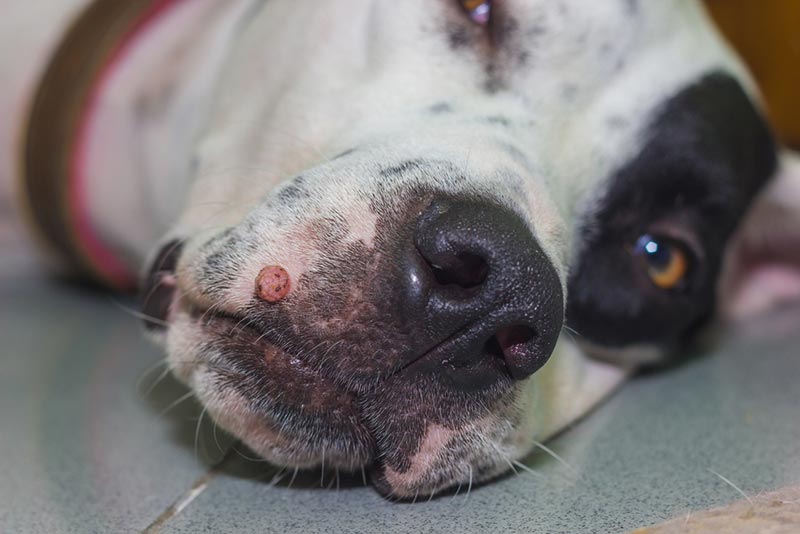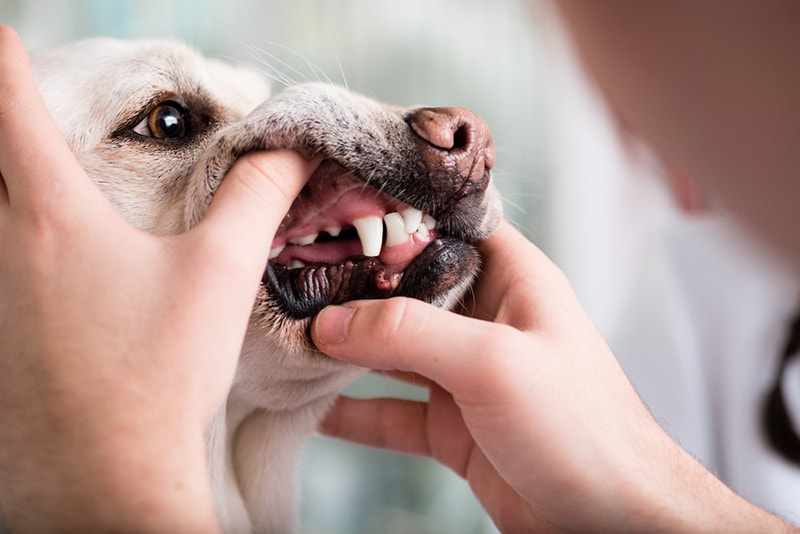Boston Terrier Health Issues – 13 Common Conditions (Vet Answer)
Updated on

Boston Terriers are compact, muscular dogs with unique black or white “tuxedo” coats. They make the best household pets with their gentle and loving nature towards humans. Unfortunately, however, these adorable dogs are susceptible to multiple health issues, including breathing, eye, and joint problems.
Whether you have a Boston Terrier or looking to adopt one, you must know the early signs of their most common health issues. This knowledge will help you find the best treatment for your pet as soon as possible.
Remember, your Boston Terrier’s health comes before everything. Here are 13 Boston Terrier health issues you must watch out for as a dog owner:
The 13 Boston Terrier Health Issues to Watch Out For
1. Brachycephalic Airway Syndrome
Boston Terriers have square heads, short noses, and flat faces. Due to these features, they are more likely to have breathing issues, known as brachycephalic airway syndrome. Their anatomy partially obstructs airflow, causing difficulty in the dog’s respiratory system.
Brachycephalic airway syndrome occurs from a combination of:
- Elongated Soft Palate – Brachycephalic syndrome can happen when the dog’s soft palette (mouth’s roof) is long enough to partially obstruct its airway.
- Everted Laryngeal Saccules – Laryngeal saccules in a dog are located in front of their vocal cords. When the saccules are turned outwards (everted), it leads to obstruction of the airflow.
-
Stenotic Nares –When the openings of the dog’s nostrils are too small, they are called stenotic nares. Such nostrils limit the amount of air that can flow in, making it hard for the Boston Terrier to breathe from their nose.

These deformities can cause severe breathing difficulty in your terrier, especially while exercising and playing. Dogs with this health issue also snore or snort louder.
Surgery may fix a few of these symptoms. However, as a responsible pet parent, you should inquire about brachycephalic syndrome from the dog breeder before adopting a pup.
2. Patellar Luxation
Patellar luxation is common in smaller dogs, including the Boston Terrier. In this condition, the dog’s kneecap slides outwards or away from its groove, also known as a slipped kneecap.
You may find your Boston Terrier stretching their legs behind to slide the kneecap back into its original place. Moreover, your pet may walk abnormally. Initially, patellar luxation seems like a mild problem, but if you don’t get it treated, it may cause inflammation in the dog’s kneecap and cause severe deformity and pain.
Patellar luxation can be a genetic health issue. So, it is essential to adopt a pup from a trustworthy breeder.
3. Hemivertebrae
Boston Terriers are famous for their cute, little corkscrew nub tail. But unfortunately, this corkscrew shape is a defect in the formation of the tailbone’s vertebrae. The condition is called hemivertebrae or misshapen vertebrae. This deformity can also occur in different regions in the spinal column.
Depending on the hemivertebrae’s location, your dog may show nerve dysfunction, including paralysis, incontinence, and wobbling hind end. Each case is different, your vet may recommend medical treatment and rest depending on your dog’s problem.

4. Corneal Ulceration
You may love the big, round eyes of your Boston Terriers, but unfortunately, they are vulnerable to several injuries. The most common is corneal ulceration.
Also known as a scratched eyeball, corneal ulcerations or abrasions occur when your dog’s cornea receives some form of trauma. It can be caused by scratches from vegetation, or self-trauma during playtime, for example. It leads to pain and a partially closed eye with discharge visible from the eyes’ edges.
Corneal ulceration is typically very painful for the pup. You may find your dog rubbing or scratching its eyes from its paws as a response to the pain. The severity can range from mild scratches to perforation of the eyeball. Contact your vet if you notice any form of eye discomfort, change of color, or discharge since, in these cases, the clock is ticking against us. The sooner your Boston Terrier gets medical care, the better chances of success.
5. Cherry Eye
Another common eye issue in Boston Terriers is the prolapse of the third eyelid gland, also called cherry eye. In this condition, a protrusion occurs in one of your dog’s third eyelid tear glands.
The common symptoms of the cherry eye include a small, round pink swelling in the inner corner of your Boston Terrier’s eyes. You can quickly identify these signs in your pet. Whenever you do, contact your vet as soon as possible to avoid further damage.

6. Entropion
Entropion is another eye problem in Boston Terriers which is included in the so-called brachycephalic ocular syndrome. Entropion makes your dog’s eyelids inverted, causing hairs to rub against their corneas. This condition requires medical attention. Depending on your dog’s age, your vet may recommend surgery straight away or may wait until your dog finishes their growing period. In that case, your vet will recommend some treatment to minimise the risks and make your Boston Terrier as comfortable as possible.
You should regularly check your Boston Terrier’s eyes. The first signs of entropion can be squinting and fluid or mucus discharge. Make sure to take your terrier to the vet as soon as possible to preserve their vision and prevent any further damage.
7. Cataracts
Cataracts can occur in pet dogs, with some breeds, like the Boston Terrier, having a genetic predisposition to them. Juvenile Boston Terriers may show early signs of cataracts, typically when they are just under 6 months of age.
Your terrier’s eyes have a lens at the back that diverts the light from the outside to the retina. This helps the dog see things. Cataracts block the light from reaching the retina, resulting in blurred vision.
Your dog will need to be assessed by your vet or ophthalmologist to discuss treatment; otherwise, cataracts can cause permanent blindness. Surgery is the only way to treat cataracts to preserve your dog’s vision.

8. Glaucoma
Glaucoma is another eye issue in Boston Terriers. It occurs when the drainage system of your dog’s eyeballs fails, leading to fluid build-up in the eye. Glaucoma involves increased ocular pressure, eventually damaging the dog’s optic nerves.
In glaucoma, your Boston Terrier will initially lose sight and their eyes will turn bluish. You may also notice a subtle bulging of their eyes and lethargy, since this is a painful condition. If you see your dog suddenly bumping into things, squinting or scratching, or rubbing their eyes, take them to the vet as soon as possible.
The treatment for glaucoma includes eye drops to balance the ocular pressure and involves close collaboration with your vet. Unfortunately, most cases of glaucoma can lead to blindness.
9. Dry Eye
The last eye problem in Boston Terriers is keratoconjunctivitis sicca or dry eye. In this condition, the dog doesn’t produce enough moisture in their eyes, which leads to soreness, itchiness, and infections.
The first sign of dry eye is a mucoid discharge and redness of the conjunctiva (also called pink eye). You may also see them pawing their eyes more frequently. If left untreated, your dog’s eyes may look dull or cloudy in this condition.
Unfortunately, keratoconjunctivitis sicca is a chronic health issue that requires life-long treatment. The good news is that, with the right treatment, it can be managed really well and your dog won’t suffer from any serious consequences.

10. Skin Allergies
Boston Terriers are likely to suffer from skin allergies over time. The most common ones include food allergies and environmental allergies (atopy). The skin may look dry and flaky with red, bumpy rashes, or they may get ear infections. You will find your dog scratching and licking their skin in response to these allergies.
Many foods and environmental factors can cause skin allergies in Boston Terriers, such as weeds, pollen, and dust mites. Allergies can’t be cured; however, your vet can help you manage the problem to keep your Boston Terrier comfortable and itch-free. Follow your vet’s advice in terms of skin care and parasite protection.
Your vet may recommend a special diet and various types of medications as well as skin supplements such as omega-fatty acids to keep your dog safe.
11. Brain tumors
Boston Terriers are, unfortunately, prone to brain tumors. This problem often manifests as seizures that occur due to abnormal electrical functions in the dog’s brain. They can make the animal lose consciousness, twitch, lose control of sphincters, and foam from the mouth.
If you observe an epileptic episode in your dog, take them to a vet as quickly as possible. They will probably recommend doing some tests to understand the underlying problem. These can involve blood tests and imaging.
Your dog will likely require anti-seizure medicines and lifestyle changes to keep the dog safe during the seizures.

12. Congenital Deafness
Boston Terriers are active, alert, and responsive dogs. However, sometimes, they may not come to you instantly or look at you when you call them by their name. When this happens, don’t think that your dog is disobedient. But instead, the chances are that they may have been born partially or completely deaf.
Deafness can occur in one or both ears of your Boston Terrier. If you see your pup struggling to respond to your command or call, take them to a vet for a check up. Your dog may have some other issues, such as an ear infection.
13. Skin Tumors
Boston Terriers can suffer from certain types of cancers, especially those on the skin. There seems to be a breed predisposition for mast cell tumor, melanoma and histiocytoma. These tumors vary in severity.
If you notice a lump anywhere in your dog’s body, contact your vet for advice. The initial assessment will likely involve a quick and simple test called “fine needle aspiration” that involves taking a tiny pain-free sample from your dog’s lump to send it for analysis. Most of the time this allows identification of the tumor and planning of surgery to remove the lump, in case it is necessary.

Some Uncommon Health Issues
Boston Terriers can have many other health issues common to other dog breeds, such as arthritis, dental diseases, and heart failure. You can try your best to prevent these issues in your dog with frequent vet check-ups, regular exercises, and a proper diet.
Conclusion
Boston Terriers are usually healthy dogs, but their short nose, flat face, and shallow orbits, make them susceptible to many issues. These include multiple breathing and eye-related conditions.
It’s recommended to keep observing your dog’s appearance and behavior. Know that there is something wrong when you see any discoloration or excess tearing in your dog’s eye. You should also notice your pet’s walking and breathing patterns.
Take your Boston Terrier for regular checkups from a professional vet to ensure your dog’s optimal health. You can spend many more years with your canine friend with proper care!
Featured Image Credit: Zakharova_Elena, Shutterstock












